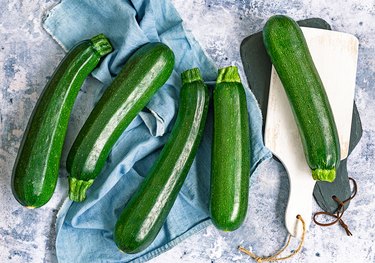
Unlike winter squash, zucchini gets harvested before it matures on the vine, while its skin is still thin and tender. When cooking or eating the fruit, you don't need to peel zucchini — the skin, flowers and seeds are all edible. You'll also find this summer squash full of nutritional benefits.
Tip
You can eat zucchini skin. The roughage from the skin can help improve digestion and provide your body necessary minerals.
Video of the Day
Video of the Day
Nutritional Value of Zucchini
According to the United States Department of Agriculture (USDA), 1 cup of raw chopped zucchini with skin contains 21 calories and 107 grams of water, making this fruit (although it's considered a vegetable in the culinary world) 95 percent water by weight. Because most of this water is found in the fruit's flesh, its skin is a more concentrated source of nutrition.
Each 1-cup serving contains the following nutrients:
- 37 percent of the recommended daily dose of vitamin C, which promotes a healthy immune system
- A little more than 1 gram of dietary fiber, to improve digestion
- 10 percent of the daily values for vitamin B-6, to benefit the central nervous system
- 10 percent of the daily values of potassium, for proper muscle contraction
- 1.5 grams of protein, to regulate the body's tissues
- 20 grams of calcium, for bone growth
- 22 grams of magnesium, to maintain muscle function
- 248 grams of vitamin A, for good eyesight
- 10 grams of sodium, for hydration
Zucchini also offers extra health benefits:
- Improved digestion: Because zucchini consists mostly of water, the fruit is easily digestible, promotes hydration and can aid in digestion. In a March 2014 review from Neurogastroenterology and Motility, the author reports that eating anti-inflammatory foods, such as non-starchy zucchini, can counter gut-related issues like irritable bowel syndrome.
- Eye protection: Lutein and Zeaxanthin, two antioxidants found in zucchini, help lower the risk of development of common age-related diseases in older age, play a vital role in ocular development in unborn babies, and are necessary for vision performance in the youth and adults, according to a September 2017 report from the Annual Review of Nutrition.
- Cell resistance: The beta-carotene in zucchini skin has antioxidant activity that protects against cellular damage, as per the authors of a July 2017 study published in Nutrients. These researchers found that the zucchini fruit plays a positive role in human health, with considerable nutritional and medical values.
Read more: 10 Vegetable Recipes that Taste Like Treats
Zucchini Skin: On or Off?
According to the BBC, zucchinis (or courgettes, as they are called in England) don't need peeling. Rather, you can eat zucchini skin on or off, whatever is your liking. However, because most of the nutrients lie in the skin, you're better off not peeling the fruit.
The BBC also states that when shopping for zucchini, you'll find it ripest during the months of June though September. You should make sure the zucchini stays firm to the touch, and you don't notice any blemishes on the skin. Soft zucchini means the fruit has gone bad.
When cooking with zucchini, you should use a lot of heat, to overcome the fruit's high water content. The BBC also says not to boil the fruit, because it will become mushy and lose flavor. Rather, you can eat it in the following ways:
- Slice it and eat it raw
- Use a spiralizer to make the fruit into the shape of noodles for an alternative to carbohydrate-rich pasta
- Cook in oil and butter for sautéed zucchini
- Stir fry the fruit with vegetables such as carrots, snap peas and mushrooms for a vegetarian dish
- Fry them in light batter, as an alternative to French fries
According to the Academy of Nutrition and Dietetics, you can store zucchini in the refrigerator for up to one week.
- Academy of Nutrition and Dietetics: “Summer Squash: Stuff It, Bake It, Grill It”
- BBC: “Glossary Courgettes”
- Nutrients: “Role of Zucchini and Its Distinctive Components in the Modulation of Degenerative Processes: Genotoxicity, Anti-Genotoxicity, Cytotoxicity and Apoptotic Effects”
- Annual Review of Nutrition: “Lutein and Zeaxanthin Isomers in Eye Health and Disease”
- Neurogastroenterology and Motility: “Tight Junctions and IBS--The Link Between Epithelial Permeability, Low-Grade Inflammation, and Symptom Generation?”
- United States Department of Agriculture: “Basic Report: 11477, Squash, Summer, Zucchini, Includes Skin Raw”